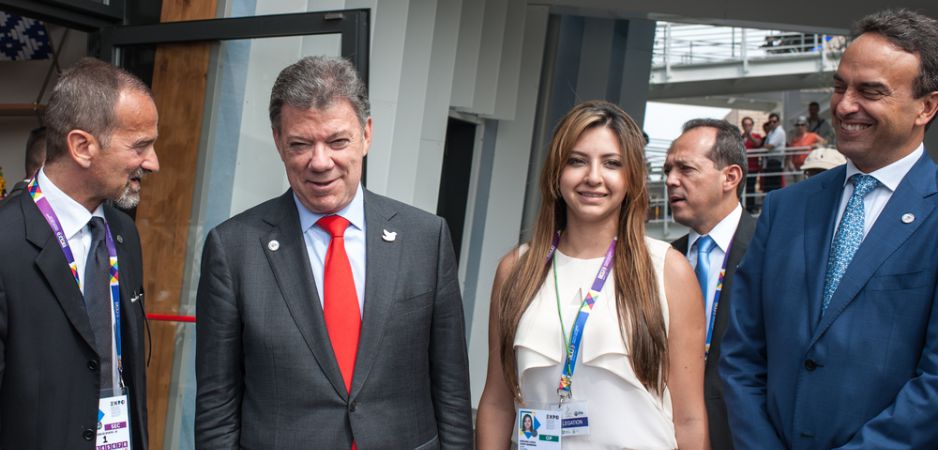The leadership of President Juan Santos has become a model for other nations in the Americas to follow.
Despite criticism of appeasement from pundits, Colombian President Juan Manuel Santos has pragmatically led his country through a difficult era and currently has it poised to reach lasting internal peace.
International relations scholar Joseph Nye describes power distribution in the contemporary era as extremely complicated due to the effects of globalization. In this new world, it is often difficult to separate domestic and international issues, thus creating the so-called “inter-mestic” issues. Leaders continue to play their traditional game of “political chess,” albeit they must now do so in a three-dimensional manner, playing vertically and horizontally on three planes concurrently.
It is difficult to find a Western Hemispheric leader who has had more accomplishments than President Santos. His policies are based on three benchmarks: the improvement in the measurements of the Fund for Peace’s Fragile States Index (FSI); the decreasing levels of coca growth and exports; and Colombia’s economic development. Colombia has made significant progress in recent years with its Plan Colombia. Recent history demonstrates what happened before the current drug policy was put in place.
Moving Forward
In late 1989, presidential candidate Luis Carlos Galán was murdered near Bogotá, allegedly by gunmen working for drug cartel king Pablo Escobar. This led to a national effort to rid Colombia of its scourge of international drug trafficking. Colombia established greater cooperation with the United States in combating the growing, cultivating and trafficking of cocaine. Over the last 25 years, Colombia has worked hard to strengthen its democracy, grow its economy and end the 50-year cycle of violence.
Arguably, the first Colombian leader to launch a holistic attempt for broad reform was President Andrés Pastrana Arango in 1998. He developed Plan Colombia to end “armed conflict, eliminate drug trafficking, and promote development.” Pastrana was followed into office by Álvaro Uribe in 2002. President Uribe fought narco-traffickers ferociously and appointed Santos as his minister of defense during those decisive years.
The Colombian drug policy is based on a comprehensive strategy, flexible policy and diffused information model. It recognizes that as Colombian economic growth continues, increased incomes will create higher drug consumption domestically. The country recently began to benefit from the plan. It shows a remarkable improvement in the FSI published annually by the Fund for Peace. More than 150 indicators form the framework of the methodology for the index. These measurements are stitched together by 12 social, economic and political primary indices. The results are exhibited in the advancement Colombia has made, moving from 41 to 61 over the last six years.
The United States’ International Narcotics Control Strategy Report shows that illicit drug-related activity in Colombia continues to drop. This has contributed to a rise in street prices of cocaine in the US, and a drop in usage from 3% to 2.2%. The Colombian cocaine yield decreased from nearly 600 metric tons (MT) in 2001 to 175 MT in 2012. The cultivation in 2013 was projected to be down another 6%. Data from the United Nations (UN) also mirrors these trends closely. The UN estimates that Colombian cocaine production has been reduced by 50% since 2007 and continues to fall. This is down considerably from an estimated 600 MT in 2000.
Nevertheless, critics persist, centering their arguments on the “balloon effect,” which shifts illicit drug cultivation to the nearby Andean states of Peru and Bolivia. Detractors point to the negative effects of aerial fumigation on rural residents. The Colombian government confronts these issues directly—coordinating with locals prior to fumigation and using alternative crop development programs. These development initiatives assisted nearly 500,000 people by 2010. Colombia also assists other Latin America countries in their fight against the illicit traffickers.
FARC
President Santos uses the security gains Colombia makes against illicit traffickers to strengthen his democratic institutions. As the Colombian military retakes the areas previously claimed by the Fuerzas Armadas Revolucionarias de Colombia (FARC), the national police replaces it to maintain peace, supported by aid agencies and the increasing professionalism of federal agencies. Colombia’s economic growth improved significantly under Santos—from 1.7% in 2009 to 6.6% in 2011—and remained strong at 4.7% in 2013. The country is becoming more economically viable as it eradicates illegal activities. Colombian Finance Minister Mauricio Cárdenas recently speculated that a peace deal with FARC could boost economic growth by another 1%.
The re-election of Santos in 2014 reflects the appreciation Colombians have for his policies. Able to wield a “stick and carrot” simultaneously, he is using his credibility as a former defense minister to negotiate a peace agreement with FARC. The president recently agreed to a bilateral ceasefire, but not before skillfully negotiating a deal to drive an ideological wedge between simple drug traffickers—las Bandas Criminales Emergentes (BACRIM)—and the radical FARC dissidents who are open to a political settlement. Santos appeals to both sides of his domestic constituency, as well as international allies as diverse as the US and Venezuela.
Santos recently angered domestic pacifists by supporting the firing of Bogotá’s leftist mayor for corruption, while annoying conservatives who desire a strictly military solution against FARC. He stayed ahead of the argument against the War on Drugs, treating domestic consumption as a health issue. In 2011, Santos, along with other Latin American presidents, called for a new global drug strategy, accentuating the current policy’s failures.
This criticism seems to have affected the verbiage of the United States’ 2013 National Southwest Border Counter Narcotics Strategy, especially regarding the illegal trafficking of firearms and bulk cash. It now appears visionary, as the US currently grapples with its own drug policy, as Maryland, Colorado, California and Washington DC have recently legalized or decriminalized some drugs, making America appear incoherent in its own federal and foreign drug interdiction policies. It seems that Santos has taken former US President Bill Clinton’s famous political skill of “triangulation” to a transnational level, all the while remaining true to Pastrana’s three original goals.
There is an old adage that states: When life hands you lemons you make lemonade. Santos has done so with his effective drug policy in Colombia, impacting the entire world. He has stayed flexible, continuously adapted his strategy, divided his enemies and built effective coalitions. Under Santos’ leadership, Colombia has improved its economic growth, decreased the amount of drugs trafficked illegally, built on its FSI standings and is in the process of negotiating a peace agreement with FARC. Concurrently, Santos constructively criticized US drug policies and improved diplomatic relations with Colombia’s counterparts throughout Latin America. In such a multifaceted and complex world, President Santos has been the epitome of a successful “inter-mestic” leader.
The views expressed in this article are the author’s own and do not necessarily reflect Fair Observer’s editorial policy.
Photo Credit: Marco Aprile / Shutterstock.com
 We bring you perspectives from around the world. Help us to inform and educate. Your donation is tax-deductible. Join over 400 people to become a donor or you could choose to be a sponsor.
We bring you perspectives from around the world. Help us to inform and educate. Your donation is tax-deductible. Join over 400 people to become a donor or you could choose to be a sponsor.
Support Fair Observer
We rely on your support for our independence, diversity and quality.
For more than 10 years, Fair Observer has been free, fair and independent. No billionaire owns us, no advertisers control us. We are a reader-supported nonprofit. Unlike many other publications, we keep our content free for readers regardless of where they live or whether they can afford to pay. We have no paywalls and no ads.
In the post-truth era of fake news, echo chambers and filter bubbles, we publish a plurality of perspectives from around the world. Anyone can publish with us, but everyone goes through a rigorous editorial process. So, you get fact-checked, well-reasoned content instead of noise.
We publish 2,500+ voices from 90+ countries. We also conduct education and training programs
on subjects ranging from digital media and journalism to writing and critical thinking. This
doesn’t come cheap. Servers, editors, trainers and web developers cost
money.
Please consider supporting us on a regular basis as a recurring donor or a
sustaining member.
Will you support FO’s journalism?
We rely on your support for our independence, diversity and quality.







Comment